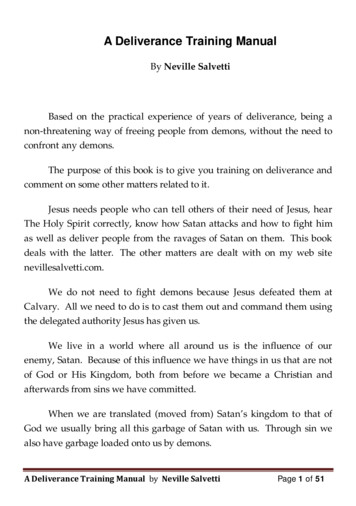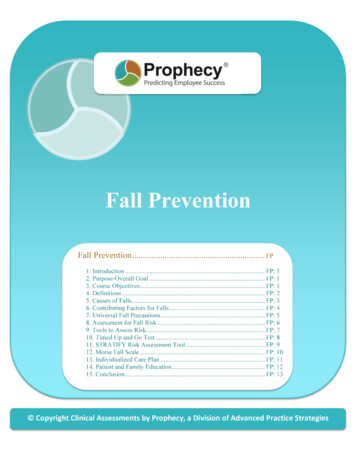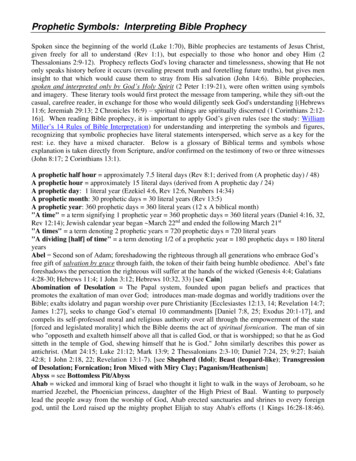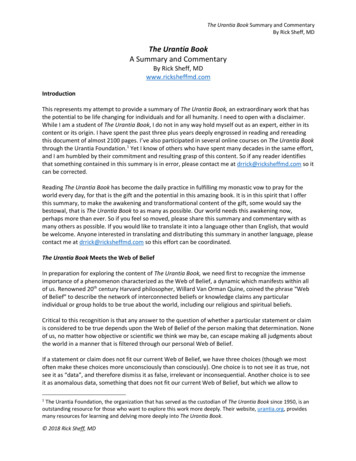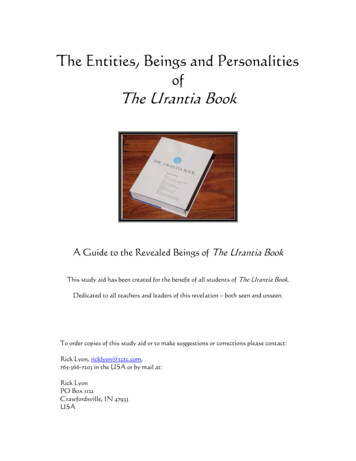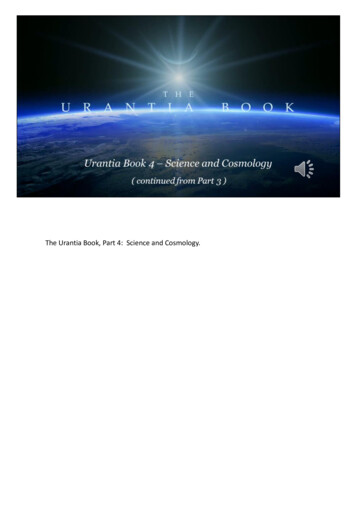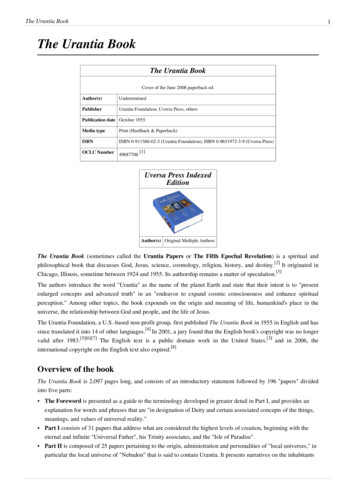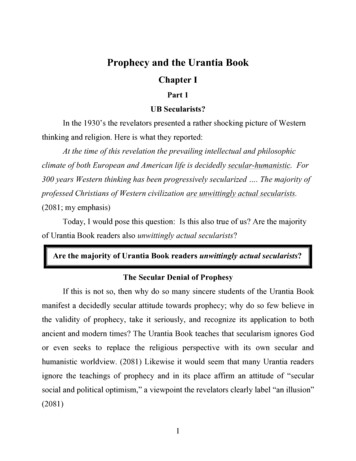
Transcription
Prophecy and the Urantia BookChapter IPart 1UB Secularists?In the 1930’s the revelators presented a rather shocking picture of Westernthinking and religion. Here is what they reported:At the time of this revelation the prevailing intellectual and philosophicclimate of both European and American life is decidedly secular-humanistic. For300 years Western thinking has been progressively secularized . The majority ofprofessed Christians of Western civilization are unwittingly actual secularists.(2081; my emphasis)Today, I would pose this question: Is this also true of us? Are the majorityof Urantia Book readers also unwittingly actual secularists?Are the majority of Urantia Book readers unwittingly actual secularists?The Secular Denial of ProphesyIf this is not so, then why do so many sincere students of the Urantia Bookmanifest a decidedly secular attitude towards prophecy; why do so few believe inthe validity of prophecy, take it seriously, and recognize its application to bothancient and modern times? The Urantia Book teaches that secularism ignores Godor even seeks to replace the religious perspective with its own secular andhumanistic worldview. (2081) Likewise it would seem that many Urantia readersignore the teachings of prophecy and in its place affirm an attitude of “secularsocial and political optimism,” a viewpoint the revelators clearly label “an illusion”(2081)1
Webster’s defines secularism as “a view of life or any particular matterbased on the premise that religion and religious considerations should be ignoredor purposely excluded.” This is the natural secular attitude towards prophecy. Thesupposedly inspired writings of the prophets are a relic of the past, an ancient andsuperstitious way of looking at the world, that is incompatible with modernscience. The future is not in God’s hands; it is up to us, and unaided humanevolution is our only hope for a better world.“religious considerations should be ignored or purposely excluded”An Example of the Secular AttitudeA good example of this secular attitude is expressed in the following letter Ireceived from a good friend of mine and sincere student of the Urantia Book, backin 1992:“I’m beginning to have doubt regarding prophecy of any sort. Couldprophecy simply be a hoax? Many of the biblical prophecies may have been putinto scripture after the fact. Were all of them? Most prophecies seem vague and thenatural course of evolving history can be made to appear to fit them any number ofways. The Bible is full of prophecies that are subject to all kinds of interpretation. Ican’t think of one single prophecy that says specifically what, when, and wheresomething will occur at a future time and it has actually irrefutably occurred.”“The only so-called prophecy I can recall from The Urantia Book is thatJesus said he will someday return, but that’s not really a prophecy, it’s a statementof Jesus’ intention. The statements about science that we haven’t discovered yetaren’t real prophecies, they’re explanations of natural phenomenon that we haven’tuncovered.”2
“Why should God be interested in giving signs to mortals? Perhaps prophecyis a left over remnant of primitive superstitions still given credence today. For aprophecy to be real wouldn’t it have to show that God is directing the affairs ofhumanity; God doesn’t really do that does he?”“So, as you can see, I’m toying with the viewpoint that if it’s called aprophecy it’s a superstitious attempt to claim something supernatural, ameaningless figment of the imagination supposedly showing God’s interventioninto human affairs.”Part 2The Prophetic ViewpointThe prophetic viewpoint stands in stark contrast to such secular attitudes ofskepticism and doubt. It affirms that God is in control of our world. His spiritualforces work behind the scenes, and sometimes openly, to influence events on earth.As the Urantia Book explicitly affirms on page 1250: “The Most Highs rule in thekingdoms of men”“The Most Highs rule in the kingdoms of men”God controls the future and God knows the future. Such knowledge isconveyed to us through the revelations of his inspired prophets. Their wordsdeserve our attention, respect, and study. Prophecy is valuable because through itsrevelations we gain a higher perspective, an enlarged viewpoint of world affairs.No longer are we limited to our purely human vision. We may view the flow ofearthly events from the transcendent perspective of a prophetic viewpoint.A friend once asked me, “Why should I study prophecy? I’m a busy person.How is prophecy relevant to me?” In reply I asked him if he rememberedHurricane Andrew? In 1992 this powerful category 4 hurricane slammed into3
southern Florida with sustained winds of 142 mph. It caused 30 billion dollars indamage, and in Dade County alone left one-quarter million people homeless.Despite the fact that it was the most expensive natural disaster in U.S. history, itresulted in only 40 deaths. I remember at the time thinking, “What if residents hadnot known of the approach of this killer hurricane and had not evacuated thepredicted areas of impact?” Obviously the death toll would have much greater. Itwas their knowledge of the approach of Hurricane Andrew that enabled the peopleto prepare for it and avoid a far greater calamity. As this example clearly shows,when we know the future we can prepare for that future; this is the vital knowledgethat prophecy provides.Viewing the flow of human events from the standpoint of prophecy can alsobring us the comfort, understanding, and stability we need to face the greatchallenges and dangers of our world. Moreover, prophecy is a most interesting andfascinating study. It not only enlarges our viewpoint; it also deepens our faith. Andwhen we witness events unfold as prophesied, we are strengthened in that faith.The word prophet comes from “pro” and “phana” and means literally, tospeak for or to say before. The words’ ancestry is clearly reflected in the two majordefinitions of a prophet given by Webster’s: (1) “A person inspired by God tospeak for him and,” (2) “A person who prophesies or foretells future events.”The Urantia Book defines this first function on page 1501 where itcharacterizes a prophet as one who “taught God’s will or proclaimed the necessityfor righteous living.” The potential of the second function, the ability to know thefuture from a transcendent perspective, is validated on page 1000 where therevelators affirm that, “true prophetic vision is a superpsychologic endowment.Such visitations are not pseudo hallucinations, neither are they trancelikeecstasies.”4
The Validity of ProphecyModern secular religionists tend to accept the validity of the first functionand reject the second. They divorce the two. They do this despite of the fact that inthe writings of the prophets these two functions are intimately associated.Moreover, if one believes that true prophets speak for God it seems unlikely on theface of it that they should be so deceived as to engage in false prophecy. It wouldmean that throughout history, prophets who taught God’s will and whom werightly revere as among the greatest men ever to inhabit the earth, were also at thesame time so blinded by “primitive superstition,” that they mistakenly thoughttheir prophecies came from God.In light of the skepticism and doubt engendered by modern secular attitudesit is helpful to review a few of the reasons a sincere student of the Urantia Bookshould be more open to the prophetic viewpoint:Jesus and ProphecyJesus was a prophet. He performed the two functions of a prophet: he taughtthe way of righteousness and he predicted the future. Not only that, he studied theJewish prophets and sought to understand his mission in terms of their predictions.A striking example of this is found in Jesus’ decision to enter Jerusalem on adonkey rather than a horse. This is described on page 1881:“Having decided upon making a public entrance into Jerusalem, the Masterwas confronted with the necessity of choosing a proper method of executing such aresolve. Jesus thought over all of the Messianic prophecies, but there seemed tobe only one which was at all appropriate for him to follow.[and which he] thoughtmight consistently be taken as a guide for his projected entry into Jerusalem. ThisScripture was found in Zechariah, and it said: ‘Rejoice greatly, O daughter of Zion;shout, O daughter of Jerusalem. Behold, your king comes to you. He is just and hebrings salvation. He comes as the lowly one, riding upon an ass, upon a colt, the5
foal of an ass.’” I think we would all agree that this is an excellent and explicitdescription of the events of Palm Sunday, and it was foretold hundreds of yearsbefore its actual occurrence.Of course, Jesus was not only guided by the prophets of old, he also madenumerous predictions himself. These include his own death and resurrection, thedestruction of Jerusalem, a future new age, and his own second coming. Jesus’prediction of the destruction of Jerusalem provides a vivid demonstration of thevalue of knowing the future through prophecy. Jesus was concerned for the safetyof his disciples and clearly told his apostles what was to be and what they shoulddo. This is recounted on page 1913: "You may remain in the city after I have gone,even through these times of travail and bitter persecution, but when you finally seeJerusalem being encompassed by the Roman armies after the revolt of the falseprophets, then will you know that her desolation is at hand; then must you flee tothe mountains . And after you have deserted the city, this disobedient people willfall by the edge of the sword and will be led captive into all nations; and so shallJerusalem be trodden down by the gentiles.” Because they believed this astoundingprophecy of Jerusalem’s complete destruction they were able to save themselves.Those who did not know or accept Jesus’ warning suffered a terrible slaughterMelchizedek and ProphecyMelchizedek, the priest of Salem, also was a prophet. He predicted that thechildless Abraham would become the father of many, that his descendants wouldsojourn in Egypt, and then would occupy Canaan, “the Promised Land.” And hepredicted the future coming of Jesus; this is recounted on page1017: “Melchizedektaught that at some future time another Son of God would come in the flesh as hehad come, but that he would be born of a woman; and that is why numerous laterteachers held that Jesus was a priest, or minister, ‘forever after the order ofMelchizedek.’”6
Melchizedek collaborated with the prophetsThe revelators tell us that after he left, “Melchizedek continued to take agreat interest in the affairs of the descendants of those men who had believed in histeachings.” We are also told that that Melchizedek has a “comprehensive plan forfar-reaching world welfare,” (853) and most significantly, that he “continued tocollaborate throughout the nineteen succeeding centuries with the many prophetsand seers .” (1024; my emphasis) The fact that Melchizedek has acomprehensive plan for our welfare and that he collaborated with the Jewishprophets suggests that elements of this plan are to be found in their teachings.The Urantia Book Exalts the ProphetsThe Urantia Book exalts the prophets and affirms the truth of their propheticviewpoint. They often quote and cast new light on Biblical prophecy. For exampleon 1488 we find the following statement: “In the Urantia records it is very difficultat times to know exactly who is referred to by the term ‘Most High.’ But Danielfully understood these matters. He said, ‘The Most High rules in the kingdom ofmen and gives it to whomever he will.’” And on page 599 we find this clarificationof John’s prophecy of a new heaven and a new earth: “It was of the conclusion ofthe terminal mission of the Teacher Sons that John wrote: ‘I saw a new heaven anda new earth and the new Jerusalem coming down from God out of heaven,prepared as a princess adorned for the prince.’”Prophecies that were Fulfilled—JeremiahWith the perspective of history we may now find many examples ofprophecies that were fulfilled. Jeremiah’s story is one of my favorites. He lived inthe sixth century BC, just before the time of the fall of Jerusalem toNebuchadnezzar. Jeremiah prophesied the destruction of Jerusalem for over twenty7
years before it actually took place in 586 BC. The rulers’ response to his messagewas to ignore his warnings and put him in prison.Jeremiah’s prophecies are very specific and right on the money. For examplein Jer. 4:6 & 7 we find this, “A great lion (Nebuchadnezzar) has gone up from histhicket, a destroyer of nations has set out; he has gone forth from his place to makeyour land a waste; your cities will be ruins without inhabitant.” And in Jer. 20:4 weread, “I will give all Judah into the hand of the king of Babylon, he shall carrythem captive to Babylon.”Jeremiah’s prophecies also provide another clear demonstration of the valueof prophecy. Jeremiah warned the rulers that Babylon would conquer Jerusalemand that they should surrender to avoid greater losses. Pause to notice that theentire fate of the Jewish nation was bound up in the rulers’ acceptance ofJeremiah’s prophecy. But they refused to listen and held fast to their purely humanviewpoint. Their failure to heed Jeremiah’s council resulted in the completedestruction of the Jewish state and 70 years of exile in Babylon.By the way, this prophecy of Jeremiah is confirmed by The Urantia Book on1067: “it was considered blasphemous treason when during the siege of Jerusalem,[Jeremiah] said; ‘And now have I given these lands into the hand ofNebuchadnezzar, the king of Babylon, my servant.’ And when Jeremiah counseledthe surrender of the city, the priests and civil rulers cast him into the miry pit of adismal dungeon.”The Urantia Book Engages in ProphecyThe Urantia Book itself engages in prophecy and contains numerous explicitpredictions of what is to come. Following are a few illustrative examples:(1) “Having summarized the teachings of Jesus about the kingdom ofheaven, we are permitted to engage in a prophetic forecast of the kingdom as itmay evolve in the age to come.” (1864; my emphasis)8
(2) “Urantia is now quivering on the very brink of one of its most amazingand enthralling epochs of social readjustment, moral quickening, and spiritualenlightenment.” (2082)(3) “Sooner or later another and greater John the Baptist is due to arise,proclaiming, ‘the kingdom of God is at hand.’” (1866)(4) “This new and oncoming social order will not settle down complacentlyfor a millennium.” (1086)These are only a very few of the many examples that could be cited. Thissubject of prophecy in the Urantia Book will be explored in greater detail in thenext section.we are permitted to engage in a prophetic forecastSummaryIn summary: For more than 300 years western thinking has become moreand more secularized. This unconscious and unrecognized secular attitude is sopervasive that it is found in the majority of professed religionists both Christianand Urantian. This “thoughtless secularism” leads many to ignore prophecy anddoubt its validity and usefulness.In contrast to such secular attitudes of doubt and skepticism the propheticviewpoint affirms that God, not man, is ultimately in control of human destiny.God knows the future and reveals it to us through prophetic revelation. Prophecy isuseful to us because it allows us to reach beyond our circumscribed humanviewpoint, and provides a higher and divine perspective on world affairs. Throughprophecy we are better able to understand and accept the unfolding of word events.And, most significantly, by knowing the future we may better prepare for thatfuture.9
If sincere students of the Urantia Book honestly examine the evidence theywill find powerful and persuasive reasons for embracing prophecy. These reasonsinclude the following: First, Jesus was a prophet. He made numerous predictions,including the destruction of Jerusalem and his own second coming. As a youth hestudied the Jewish prophets and as an adult he conducted his life mission in thelight of their pronouncements. Second, Melchizedek was also prophet. Hepredicted that the childless Abraham would become the father of the Jewish peopleand the future coming of Jesus. Of special significance is the fact that he has a planfor the rehabilitation of our planet, and that he actually collaborated with the OldTestament prophets. Third, in the light of history we may now recognize manyclear examples of fulfilled prophecy. Jeremiah’s prediction of Jerusalem’sdestruction and the Babylonian captivity is one such example. Fourth, the UrantiaBook exalts the prophets, affirms the validity of prophecy, and often confirms andclarifies specific prophecies. Fifth, the Urantia Book itself makes numerous“prophetic forecasts.” One that is especially meaningful to us is its prediction of animpending new age, a better time to come.In conclusion, these and other considerations suggest that we should guardagainst the secular bias of modern times, and open ourselves to the validity andvalue of prophecy.“open ourselves to the validity and value of prophecy”10
Chapter IIPart 1Urantia Book Prophecy and the Secular-Spiritual ConflictIf we are open to prophecy and read the Urantia Book with an eye forprophetic content, there is much we can learn about our future. By being alert tostatements and phrases that offer prophetic clues to the future, we can gather anamazing wealth of information. For example, consider the rise of modernsecularism and its conflict with religion. What may we learn about the future ofthis struggle and what will be its final outcome?The future grows out of the present and to properly understand our future wealso need to understand present conditions. One of the reasons I find the propheticcontent of the Urantia Book to be particularly helpful is that it actually tells us boththe present and the future. And in the case of the secular-spiritual conflict, it offersus an even deeper understanding by also providing the historical factors that lead toour present state of affairs.History of SecularismOn page 2081 the midwayers tell us that modern secularism was fostered bytwo world-wide influences: “the narrow minded and godless attitude of nineteenthand twentieth century so-called science—atheistic science,” and “the totalitarianmedieval Christian church.” It had its inception as “a rising protest against thealmost complete domination of western civilization by the institutionalizedChristian church.” Secularism has brought us numerous benefits, whichcontributed to its rise and present popularity: it broke the bonds of church control,and has promoted tolerance, social service, democratic government, civil liberties,science, and education.11
The Predicted Results of SecularismHowever, along with these positive results the midwayers also reveal thatsecularism has brought numerous unintended consequences. As we look at theirdiscussion of these negative results, we need to remember that these words wereindicted some 70 years ago. With the perspective of history we can now see thattheir analysis has proven to be an amazingly accurate prediction of the direction ofworld events in both the twentieth and now the twenty-first centuries. And theirprophetic forecasts of the outworking of secularism are even more applicabletoday; in fact we may view them as reliable predictors of a future that will beplayed out in our own lifetimes. We live in a world in which secularism and itsstruggle with religion is ever growing in prominence, and progressing towards afinal climax.The Blighting of Spiritual ExperienceIn 1935 the revelators clearly warned us of the devastation secularism wouldbring; this is what they said:even after materialism and mechanism has been more or less vanquished thedevastating influence of twentieth century secularism will still blight the spiritualexperience of millions of unsuspecting souls. (2081; my emphasis)At the outset let us clearly understand this great danger that secularismposes—it blights spiritual experience. In the plant world, blight first causes theplant to cease growing, then to decay, and finally to die. And this is an aptdescription of the effect that modern secularism has on religious faith and spiritualexperience. This is the greatest and most insidious effect of modern secularism;without our knowledge it effectively blocks and eventually destroys spiritualexperience and religious living. And it does so on a vast scale, affecting “millionsof unsuspecting souls.”12
Social DisintegrationA second major effect of secularism is the disintegration of society.Consider the following analysis of conditions in the 1930’s, and notice that themidwayers warning of coming social disintegration has proven all too true:Without God, without religion, scientific secularism can never co-ordinateits forces. This secularistic human society, notwithstanding its unparalleledmaterialistic achievement, is slowly disintegrating. (2082; my emphasis)Now whether we are talking about marriage, family life, communities,ethnic and religious strife, national affairs, or international relations, who candoubt that such social disintegration has taken place and indeed is a definingcharacteristic of modern times? And if we look to the future we may discern thatwe face continuing social disintegration until that day when secularism is finallyovercome.The Rise of Totalitarian StatesA third predicted effect of secularism is the rise of totalitarian states. Onpage 2081 the revelators warn us of this totalitarian threat:Secularism did break the bonds of church control, and now in turn itthreatens to establish a new and godless type of mastery over the hearts and mindsof modern man. The tyrannical and dictatorial political state is the direct offspringof scientific materialism and philosophic secularism. Secularism no sooner freesman from the domination of the institutionalized church than it sells him intoslavish bondage to the totalitarian state.Totalitarianism is defined as “domination by a government of all political,social, and economic activities in a nation.” It first appeared in the Soviet Unionunder Lenin and Stalin, and later in the 1930’s under Hitler’s National Socialism.13
Benito Mussolini was the first to use the word totalitarian to describe his Italiandictatorship. One can distinguish the totalitarian regime from all traditionaltyrannies by its mobilization of entire populations in support of the state and itspolitical ideology. Later twentieth century examples of totalitarian societiesinclude Maoist China, the Cambodian Khmer Rouge, the Laotian Pathet Lao, theTaliban in Afganistan, and Sadam Hussain’s Iraq. Some present day examplesinclude Lybia under Qadaffi, Bathist Syria, the Socialist Republic of Vietnam, andNorth Korea. This rise of powerful totalitarian states was a distinct feature of the20th century that continues to the present day, and poses the major politicalchallenge to the 21st century. Most ominously the new century has witnessed anew form of this threat in the rise of a militant and totalitarian Islam. As we look tothe future we must have the courage to face the tests that lie before us; and thisworldwide struggle between totalitarianism and freedom will characterize thetwentieth-first century.Unrest, Animosity, Unhappiness, War, and World-Wide DisasterThe fourth predicted effect has the ring of apocalyptic prophecy as therevelators warn us of coming war and world-wide disaster. One of the majorbarriers to accepting prophecy is fear—especially the fear of facing an unknownand possibly unpleasant future. A prophetic viewpoint requires courage and awillingness to sincerely and honestly follow the truth no matter where it leads,regardless of the consequences. In the case of secularism the revelators explicitelywarn us that this godless philosophy will bring a future of fearsome challenges.The following statement makes this quite plain:Twentieth-century secularism tends to affirm that man does not need God.But beware! this godless philosophy of human society will lead only to unrest,animosity, unhappiness, war, and world-wide disaster. (2081; my emphasis)14
Notice the verb “will lead”; this signifies a statement about our future, and isa very clear example of prophecy in the Urantia Book. Not only are the revelatorsforetellng the future; they are warning us about it, just as did the prophets of old.They say “But beware.” In other words, watch out for what is coming. Secularismwill lead to disasterous consequences, and this is what you should expect. Therevelators reinforce and emphasize this point later in the same section, againwarning us that:The complete secularization of science, education, industry, and society canlead only to disaster. (2082)The verb phrase “can lead only” leaves little room for doubt as to whatsecularism will mean to our future; on page 2082 the midwayer commission givesthis somber assessment:During the first third of the twentieth century Urantians killed more humanbeings than were killed during the whole of the Christian dispensation up to thattime. And this is only the beginning of the dire harvest of materialism andsecularism; still more terrible destruction is yet to come. (2082; my emphasis)With 70 years of history we can bear witness to the truth of this prophecy.For example, the twentiety century has been characterized in a documentary serieson the History Channel as “The Century of Warfare.” Since this prediction of “stillmore terrible destruction yet to come” America has experienced World War II, theKoren War, Vietnam, the Afganistan war, and two wars against Iraq. There havebeen numerous other large and small wars around the globe such as two ArabIsraeli wars, the Russian-Afganistan war, the Chinese civil war, and the Iran-Iraqwar. In World War I eight and a half million soldiers lost their lives Since therevelators prediction that this was only the beginning of the dire harvest ofmaterialism and secularism, some thirty million more soldiers have been killed inwar.15
As long as secularism rules the hearts and minds of mankind, war anddestruction will not end—this is the prophecy of the Urantia Book. We must havethe courage to face the future and trust in God to protect, guide, stabilize, andstrengthen us through the challenges that lie ahead.Part 2Secular-Spiritual Conflict and the Triumph of the SpiritualNow if this were the end of the story, we would face a very bleak futureindeed. But this is not the end of the story There are also many positive propheciesin the Urantia Book alongside these negative predictions. They foretell a verydifferent future; one filled with great hope for our world. Listen as the revelatorspredict, over and over, the rise of Jesus and the fall of secularism:When the present superstition revolt is over, the truths of Jesus’ gospel willpersist gloriously to illuminate a new and better way. (2082)A new and fuller revelation of the religion of Jesus is destined to conquer anempire of materialistic secularism and overcome a world sway of mechanisticnaturalism, (2082)No matter what the apparent conflict between materialism and the teachingsof Jesus may be, you can rest assured that, in the ages to come, the teachings of theMaster will fully triumph. (2076)Religion is now confronted by the challenge of a new age of scientific mindsand materialistic tendencies. In this gigantic struggle between the secular and thespiritual, the religion of Jesus will eventually triumph. (2075)“the religion of Jesus will eventually triumph”We have endured the bad news, now finally we hear the good news. There islight at the end of the tunnel! Yes, there are great challenges we must face, but16
secularism and its effects are not the only factors in our world. The spiritualworkings of the life and teachings of Jesus are also present and they will eventuallyfully triumph over secularism.The Triumph of the Spiritual is Happening NowThere is more good news; we do not have to wait until a future age for thetriumph of the spiritual; it is alrady underway! Even now, at the height of thesecular dominance of planetary life, the teachings of Jesus are at work overcomingthe entrenched forces of secularism. This is plainly stated on page 2082:The teachings of Jesus . are even now slowly triumphing over thematerialism, mechanism, and secularism of the twentieth century. (my emphasis)Thus, if we look to the future with faith in Urantia Book prophecy, we mayexpect to witness not only increasing conflict between the secular and the spititual,but also the growing power of the spiritual, and ultimately the full and finaltriumph of the teachings of Jesus.The Next Step in our Spiritual Evolution—A New Revelation of JesusThere is more good news, and it is particularly relevant to our presentgeneration. For we are told that we live in a time and a future that will witness anew and powerful revival of the true teachings of Jesus. This will be the next stepin our religious evolution. Listen carefully as the midwayers make clear that thethe time for this rediscovery of Jesus is now:The hour is striking!The hour is striking for a rediscovery of the true and original foundations ofpresent-day distorted and compromised Christianity—the real life and teachings ofJesus. (2083; my emphasis)17
The time is ripe to witness the figurative resurrection of the human Jesusfrom his burial tomb amidst the theological traditions and the religious dogmas ofnineteen centuries. (2090; my emphasis)Modern culture must become spiritually baptized with a new revelation ofJesus’ life and illuminated with a new understanding of his gospel of eternalsalvation (2084; my emphasis)Notice the dramatic imagery used by the authors to underline the significanceof our times; they tell us that the hour is striking, that the time is ripe, and speak ofmodern cul
The Urantia Book Exalts the Prophets The Urantia Book exalts the prophets and affirms the truth of their prophetic viewpoint. They often quote and cast new light on Biblical prophecy. For example on 1488 we find the following statement: “In


